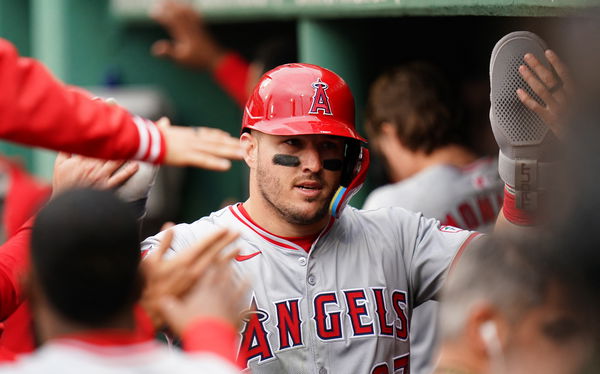
USA Today via Reuters
Apr 14, 2024; Boston, Massachusetts, USA; Los Angeles Angels center fielder Mike Trout (27) scores against the Boston Red Sox in the eighth inning at Fenway Park. Mandatory Credit: David Butler II-USA TODAY Sportsk

USA Today via Reuters
Apr 14, 2024; Boston, Massachusetts, USA; Los Angeles Angels center fielder Mike Trout (27) scores against the Boston Red Sox in the eighth inning at Fenway Park. Mandatory Credit: David Butler II-USA TODAY Sportsk
Mike Trout knew this day would come. He just didn’t expect it to feel like this. For over a decade, Trout patrolled center field like it was his birthright—diving catches, cannon throws, effortless grace. But now, after years of injuries and frustration, he’s shifting to right field, a move that feels less like a tactical adjustment and more like an undeniable checkpoint in his career. The sportscaster’s reaction to hearing Trout’s voice—flat, resigned, almost bracing himself for impact—said it all: “He sounds defeated.”
The news itself isn’t shocking. Mike Trout, now 33, has battled a relentless cycle of injuries, robbing him of full seasons and the chance to rewrite record books the way he was once destined to. He still can be great, but for how long? His body is telling him something, and so is the Angels’ front office. Moving out of center field isn’t just about preserving health; it’s an admission that time is catching up. Trout himself seemed to understand that. In an emotional moment, he reportedly said, “Dude, I just want to f—ing play, man. I just want to be healthy. I just want to be on the field.”
ADVERTISEMENT
Article continues below this ad
A hard pill to swallow: Mike Trout accepting a new reality
Jared Carrabis and his co-hosts felt the weight of it, especially after hearing the audio on the Underdog MLB YouTube video. They said, “He knew that the day that Mike Trout is no longer center fielder, Mike Trout, he knew that that would be a point in his career where things are changing, where the legacy… this is now a checkpoint in the career, right?” The words hung in the air, carrying an uncomfortable reality. This wasn’t the confident, determined voice of an athlete proving doubters wrong. This was a man who knew his career had reached a turning point and who had no choice but to face it head-on.

This isn’t just about a position change. It’s about identity. For years, Trout has been the guy, the best player in baseball, the all-time WAR leader through age 28. But the last four seasons have chipped away at that. Shohei Ohtani stole the headlines. The Angels, despite all the money and all the attempts, never got anywhere. Now, Mike Trout is standing at a crossroads, and he knows the questions are coming: Are you still the same player? Will you ever be?
ADVERTISEMENT
Article continues below this ad
Maybe this is the start of his reinvention. Maybe moving to the right field will buy him a few more productive years. But as he faces this reality, one thing is clear—he sees the writing on the wall. And if the sound of his voice says anything, he knows it too.
What’s your perspective on:
Is Mike Trout's move to right field the beginning of the end or a new chapter?
Have an interesting take?
Will the right field be the answer? The risk and reward of trout’s move
Mike Trout’s decision to transition to the right field clearly reflects the toll that his body has taken in years due to various injuries hindering his ability to stay active on the field. His battles with injuries have been particularly challenging, including a calf strain in 2021 that kept him out for much of the season and a rare back condition in 2022 that raised concerns about his long-term durability. Last season, a fractured hamate bone in his hand sidelined him for months, further hampering his ability to perform at his peak.
ADVERTISEMENT
Article continues below this ad
To minimize wear and tear and ensure presence in the lineup, he made a strategic move out of center field—a position that requires continuous sprint work, rapid directional changes, and impactful plays. But even with the positional change, there’s no guarantee that the right field will be a cure-all. Mike Trout’s injuries haven’t been limited to just the physical strain of center field; his back issues, in particular, could remain a persistent concern no matter where he plays.
In the end, if his body cooperates, this move could extend his career and keep his bat in the Angels’ lineup. If not, it might signal the beginning of a difficult final chapter for one of baseball’s greatest players.
ADVERTISEMENT
ADVERTISEMENT
ADVERTISEMENT
ADVERTISEMENT


Is Mike Trout's move to right field the beginning of the end or a new chapter?